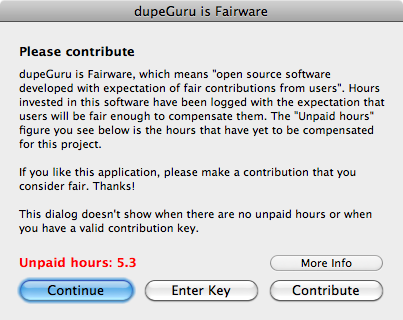Fairware
 “ Fairware ” is a term recently coined by Hardcoded Software . It stands for open source software aimed at a wide audience (for proprietary applications, the shareware license is a direct analogue) in order to get decent compensation from users.
“ Fairware ” is a term recently coined by Hardcoded Software . It stands for open source software aimed at a wide audience (for proprietary applications, the shareware license is a direct analogue) in order to get decent compensation from users. The term combines two principles:
1. Intellectual property does not make sense ( at least in the software world) From the protection of intellectual property, troubles are always and everywhere. Software patents surround developers from all sides like anti-personnel mines. Proprietary licensing forces programmers to create the same code over and over in a stupid game, while the end user loses (the final product is the result of competition, not joint efforts). Some users even get into the network of unscrupulous software companies that squeeze everything from customers to the last cent, taking advantage of the hopeless situation of consumers caught in the trap.
2. Developers need to eat. It is difficult for developers to get an adequate fee for developing core software for a wide audience. Of course, they will receive a certain amount from voluntary donations of users, but we can say with confidence that this will not pay for the full daily work on the STR. Therefore, programmers work on their open source projects in their free time, which reduces the quality of applications. If given a chance, they will quit their main job and work on their projects, creating a free alternative to proprietary applications. In the future, such products could make intellectual property meaningless, but, unfortunately, now money is flowing to these very developers of proprietary products, negating all work on free software on a global scale.
Fairware
Fairware is open source software with a belief in user honesty. If this can be allowed (and I sincerely believe that it is possible), then we can build a system that helps “express their honesty” (help the project). It is difficult to understand how much help will be needed if the usual Donate button is used. Who worked on the project? What time is it? How much money have you already donated? All these questions require answers before an honest amount can be calculated to help the project. Even if the user wants to help, there is a great chance that laziness will win, and the lack of information about the correct amount of the donation will lead to the decision “not to help”.
How does Fairware work?
All information on labor costs in hours is laid out in the public domain, as well as the estimated hourly rate. All money transfers from users are also automatically shared (anonymously). When a contribution is made, the amount is distributed among the developers in proportion to the number of unpaid hours of each programmer. Anyone can easily find out how many more hours are not compensated. The application also notifies users that it is “fairware” with a dialog box for those who have not yet contributed, and reminds that developers are waiting for a fair payment for their work. With a sufficient number of honest users, such a system will allow developers of open source software to work on projects for a wide audience full time. I don’t know how about you, but I think it’s great !
What next?
Without trying to deprive someone of their laurels, I clarify that this topic is my translation of the article “ About Fairware ”. The
author’s terms are described in more detail in my translation of his article “Free as in Speech, Fair as in Trade” . By the way, this is not just a term. The author opened the code of his commercial paid applications and has been using this type of licensing for 4 months already.
Update: Figures
Hardcoded Software, statistics from 09/13/2010 (all, incidentally, was obtained in 5 minutes on his website).
At the moment, 5885.95 Ever- American have been included in the project . A total of 220.3 hours were spent , of which 56.8 were not paid .
Simple arithmetic shows that the author’s rate is $ 35.9 per hour . As for me - the system is more than working.
In fact, after working for 4 months 27 full working days, the author receives almost $ 36 per hour - this is a very good result. And, judging by the fact that the author did not return to the old version of distribution, his income increased.
